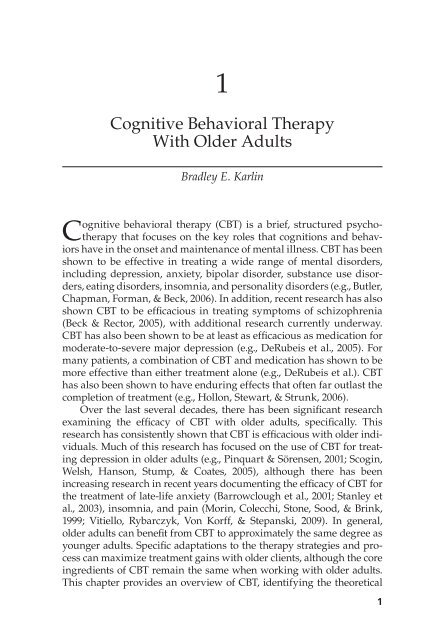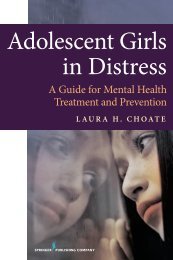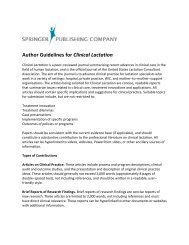Cognitive Behavior Therapy with Older Adults - Springer Publishing
Cognitive Behavior Therapy with Older Adults - Springer Publishing
Cognitive Behavior Therapy with Older Adults - Springer Publishing
Create successful ePaper yourself
Turn your PDF publications into a flip-book with our unique Google optimized e-Paper software.
1<br />
<strong>Cognitive</strong> <strong>Behavior</strong>al <strong>Therapy</strong><br />
With <strong>Older</strong> <strong>Adults</strong><br />
Bradley E. Karlin<br />
C<br />
ognitive behavioral therapy (CBT) is a brief, structured psychotherapy<br />
that focuses on the key roles that cognitions and behaviors<br />
have in the onset and maintenance of mental illness. CBT has been<br />
shown to be effective in treating a wide range of mental disorders,<br />
including depression, anxiety, bipolar disorder, substance use disorders,<br />
eating disorders, insomnia, and personality disorders (e.g., Butler,<br />
Chapman, Forman, & Beck, 2006). In addition, recent research has also<br />
shown CBT to be efficacious in treating symptoms of schizophrenia<br />
(Beck & Rector, 2005), <strong>with</strong> additional research currently underway.<br />
CBT has also been shown to be at least as efficacious as medication for<br />
moderate-to-severe major depression (e.g., DeRubeis et al., 2005). For<br />
many patients, a combination of CBT and medication has shown to be<br />
more effective than either treatment alone (e.g., DeRubeis et al.). CBT<br />
has also been shown to have enduring effects that often far outlast the<br />
completion of treatment (e.g., Hollon, Stewart, & Strunk, 2006).<br />
Over the last several decades, there has been significant research<br />
examining the efficacy of CBT <strong>with</strong> older adults, specifically. This<br />
research has consistently shown that CBT is efficacious <strong>with</strong> older individuals.<br />
Much of this research has focused on the use of CBT for treating<br />
depression in older adults (e.g., Pinquart & Sörensen, 2001; Scogin,<br />
Welsh, Hanson, Stump, & Coates, 2005), although there has been<br />
increasing research in recent years documenting the efficacy of CBT for<br />
the treatment of late-life anxiety (Barrowclough et al., 2001; Stanley et<br />
al., 2003), insomnia, and pain (Morin, Colecchi, Stone, Sood, & Brink,<br />
1999; Vitiello, Rybarczyk, Von Korff, & Stepanski, 2009). In general,<br />
older adults can benefit from CBT to approximately the same degree as<br />
younger adults. Specific adaptations to the therapy strategies and process<br />
can maximize treatment gains <strong>with</strong> older clients, although the core<br />
ingredients of CBT remain the same when working <strong>with</strong> older adults.<br />
This chapter provides an overview of CBT, i dentifying the theoretical<br />
1

















